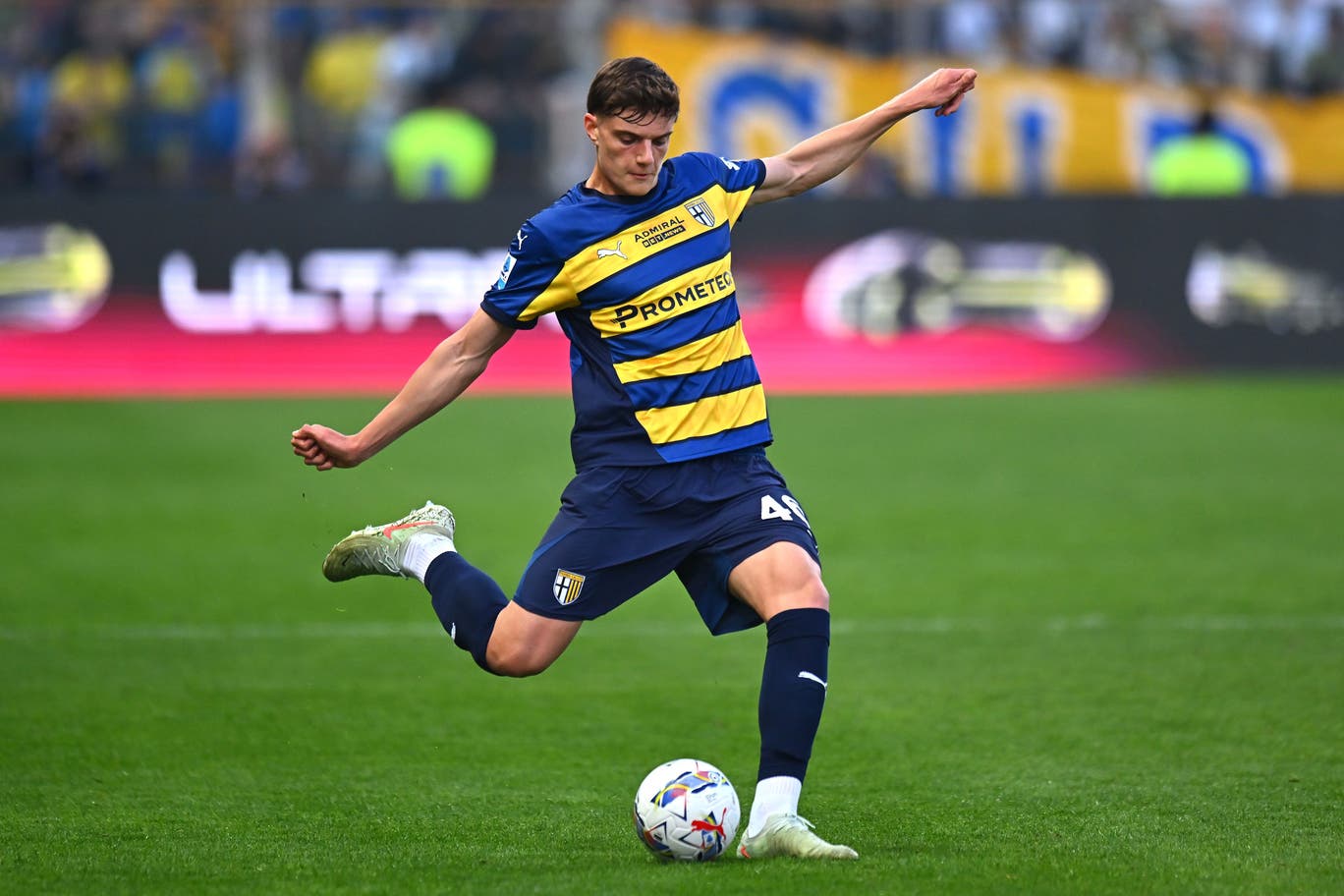Liverpool’s Defensive Revolution: A Comprehensive Analysis of Summer Transfer Strategy

Liverpool Football Club’s summer transfer window has been nothing short of extraordinary, marked by ambitious spending and strategic squad restructuring that signals the club’s unwavering commitment to maintaining their position among European football’s elite. The latest development in this remarkable window sees the Reds agreeing a £26 million fee with Parma for teenage Italian defender Giovanni Leoni, a move that exemplifies the club’s forward-thinking approach to squad building and their determination to address defensive vulnerabilities that have emerged during their recent campaigns.
The agreement for Giovanni Leoni represents far more than a simple transfer transaction; it embodies Liverpool’s philosophical commitment to identifying and nurturing exceptional young talent while addressing immediate squad needs. At just 18 years old, Leoni has already established himself as one of European football’s most promising defensive prospects, attracting attention from several elite clubs including Internazionale and other Premier League sides.
The Italian Under-19 international’s preference for Liverpool over other suitors speaks volumes about the club’s current appeal and the project being constructed under new head coach Arne Slot. This preference wasn’t accidental but rather the result of Liverpool’s comprehensive approach to player recruitment, which extends beyond financial offers to encompass career development opportunities, playing philosophy alignment, and the club’s proven track record of nurturing young talent into world-class performers.
Leoni’s imminent arrival at Merseyside for medical examinations and personal terms discussions represents a crucial juncture in Liverpool’s defensive reconstruction. The club’s decision to integrate him directly into the first-team squad, ruling out any loan arrangements, demonstrates their confidence in his immediate ability to contribute at the highest level. This approach mirrors Liverpool’s historical success with young players like Trent Alexander-Arnold and Curtis Jones, who seamlessly transitioned from academy prospects to integral first-team components.
The defender’s technical profile aligns perfectly with Liverpool’s tactical requirements under Slot’s system. His composure on the ball, aerial ability, and tactical intelligence make him an ideal candidate for the high-line defending that characterizes Liverpool’s approach. Furthermore, his youth provides the club with a long-term solution to their defensive needs, potentially offering a decade or more of service while developing into one of European football’s premier center-backs.
Leoni’s acquisition pushes Liverpool’s summer spending beyond the £300 million threshold, a figure that reflects the club’s ambitious vision for the upcoming season and beyond. This substantial investment represents more than mere squad strengthening; it signifies a fundamental shift in Liverpool’s transfer philosophy, moving from their historically cautious approach to a more aggressive strategy designed to maximize their competitive window.
The £26 million fee for Leoni, while significant for a teenage player with limited top-flight experience, represents excellent value in the current transfer market. Comparable young defenders have commanded significantly higher fees, making Liverpool’s negotiation with Parma a shrewd piece of business. The club’s recruitment team, led by sporting director Richard Hughes, has demonstrated exceptional market awareness in identifying Leoni before his value escalates further.
This transfer forms part of a broader strategic vision that has seen Liverpool make five other major signings, including Florian Wirtz, Hugo Ekitike, Jeremie Frimpong, Milos Kerkez, and the previously arranged transfer of Giorgi Mamardashvili from Valencia. Each acquisition addresses specific tactical requirements within Slot’s system while maintaining the squad’s competitive balance across all positions.
The club’s willingness to invest heavily reflects their understanding of the modern football landscape, where success requires continuous squad evolution and the ability to compete financially with Europe’s wealthiest clubs. Liverpool’s owners, Fenway Sports Group, have clearly sanctioned this ambitious spending spree, recognizing that the club’s recent successes create both opportunity and obligation to maintain their competitive standards.
Liverpool’s pursuit of defensive reinforcements stems from genuine concerns about their backline’s recent performances and structural composition. Head coach Arne Slot’s admission that defending has been a concern, particularly after conceding nine goals in their last four games including the Community Shield defeat to Crystal Palace, underscores the urgency behind these recruitment efforts.
The statistical evidence supporting Liverpool’s defensive concerns extends beyond recent matches to encompass broader tactical vulnerabilities. Their high-line approach, while effective in creating attacking opportunities through quick transitions, has occasionally left them exposed to pacey forwards and direct attacking play. The addition of young, athletic defenders like Leoni provides the physical and technical attributes necessary to maintain this tactical approach while minimizing associated risks.
The departure of Jarell Quansah to Bayer Leverkusen created an immediate vacancy in Liverpool’s defensive hierarchy, one that required swift action to address. Quansah’s sale, while potentially profitable for Liverpool, highlighted the club’s need for defensive depth, particularly given the physical demands of competing across multiple competitions throughout the season.
Liverpool’s defensive personnel challenges have been further complicated by injuries and illness affecting key players. Joe Gomez’s injury problems and Virgil van Dijk’s recent illness forced the club to deploy midfielders Ryan Gravenberch, Wataru Endo, and Trey Nyoni, as well as left-back Andy Robertson, in central defensive roles during pre-season. This makeshift approach, while demonstrating squad versatility, underlined the necessity for specialist central defenders capable of meeting the tactical and physical demands of the position.
The contractual situation surrounding Ibrahima Konate adds another layer of complexity to Liverpool’s defensive planning. With the French international entering the final year of his contract, the club faces potential future departures that could further destabilize their defensive structure. Leoni’s acquisition provides insurance against such scenarios while creating healthy competition for places that typically elevates individual and collective performances.
The arrival of Giovanni Leoni must be understood within the context of Arne Slot’s tactical philosophy and his vision for Liverpool’s playing style. The Dutch coach, who arrived from Feyenoord with a reputation for developing young players and implementing sophisticated tactical systems, has clearly identified defensive reinforcement as a priority for his Liverpool project.
Slot’s preferred tactical approach emphasizes possession-based football with high pressing and quick transitions between defensive and attacking phases. This system requires central defenders who are comfortable receiving the ball under pressure, capable of accurate distribution, and possessing the pace and positioning to defend large spaces behind the defensive line. Leoni’s profile suggests he possesses these attributes, making him an ideal candidate for integration into Slot’s tactical framework.
The coach’s experience in developing young talent at Feyenoord provides confidence in his ability to maximize Leoni’s potential. Slot’s track record includes successfully integrating teenage players into first-team football while maintaining competitive standards, a skill that will prove invaluable in Leoni’s development at Liverpool.
Furthermore, Slot’s tactical flexibility allows for various defensive configurations, potentially enabling Leoni to play in different roles within the defensive structure. Whether as part of a traditional two-center-back system or in a more expansive three-at-the-back formation, Leoni’s versatility provides Slot with tactical options that could prove crucial across a demanding season.
The integration process will likely involve careful management of Leoni’s playing time and responsibilities, gradually increasing his involvement as he adapts to the Premier League’s intensity and Liverpool’s specific tactical requirements. Slot’s methodical approach to player development suggests he will prioritize Leoni’s long-term growth over immediate impact, though the player’s quality may accelerate this timeline.
Liverpool’s concurrent pursuit of Crystal Palace center-back Marc Guehi represents a sophisticated dual-pronged approach to defensive reinforcement. The England international offers a different profile to Leoni, providing immediate Premier League experience and proven quality at the highest level of English football.
Guehi’s potential acquisition would create a formidable defensive partnership with Virgil van Dijk while providing competition and depth across all central defensive positions. The 24-year-old’s leadership qualities, demonstrated through his performances for both club and country, would complement Leoni’s youthful enthusiasm and technical ability.
However, negotiations with Crystal Palace present more complex challenges than the Leoni deal. Palace’s valuation of their star defender, combined with his importance to their own tactical system, creates significant obstacles to any potential transfer. Liverpool’s approach to these negotiations will require careful balance between financial prudence and competitive necessity.
The club’s statement that Leoni’s acquisition has “no bearing” on their interest in Guehi suggests Liverpool are prepared to invest in both players if circumstances permit. This approach would provide Slot with exceptional defensive depth and flexibility, enabling rotation and tactical variation across a season that will include domestic league and cup competitions alongside European commitments.
Should Liverpool successfully complete both signings, their defensive options would rank among the strongest in European football. The combination of experience (van Dijk, Guehi), emerging talent (Leoni), and proven quality (Gomez, Konate) would provide the foundation for sustained success across multiple competitions.
Liverpool’s current transfer approach represents a significant evolution from their historical recruitment strategy. Under previous ownership and management structures, the club often operated with financial constraints that limited their ability to compete for the most sought-after talents. The current willingness to invest heavily in young players like Leoni demonstrates both increased financial capacity and strategic confidence in their development capabilities.
The transformation began during Jurgen Klopp’s tenure, when Liverpool demonstrated their ability to identify and develop exceptional talents like Sadio Mane, Mohamed Salah, and Andrew Robertson. These successes provided both financial returns and sporting achievements that have enabled the current ambitious transfer strategy.
Leoni’s signing also reflects broader changes in football’s transfer market, where clubs increasingly prioritize potential over proven performance when investing in young players. The inflation in transfer fees for established stars has made promising teenagers increasingly attractive alternatives, provided clubs possess the development infrastructure to maximize their potential.
Liverpool’s track record in this regard provides confidence in their ability to successfully integrate Leoni. The club’s academy and first-team coaching staff have consistently demonstrated their capability to accelerate young players’ development, creating pathways from potential to performance that justify significant initial investments
Liverpool’s return to European competition creates additional demands on their squad depth that influence their transfer strategy. The condensed fixture schedule, combined with the physical and tactical intensity of competing across multiple fronts, requires a broader selection of quality players capable of maintaining performance standards throughout the season.
Leoni’s addition provides crucial depth in central defense, a position where injuries or suspensions can significantly impact tactical stability. The ability to rotate personnel without compromising defensive solidity will prove essential during intensive periods of the season, particularly in the latter stages of European competition where marginal advantages often determine success.
The young defender’s versatility also provides tactical flexibility for different opponents and competition formats. European football often requires tactical adjustments based on opposition strengths and competition-specific considerations, making adaptable players like Leoni particularly valuable assets.
Furthermore, Liverpool’s European commitments create additional revenue streams that help justify their substantial transfer investments. Success in continental competition, both financially and reputationally, provides returns that extend beyond immediate sporting achievements to encompass commercial opportunities and player recruitment advantages.
The acquisition of Giovanni Leoni represents more than immediate squad strengthening; it embodies Liverpool’s long-term vision for sustainable success through youth development and strategic recruitment. The club’s commitment to his immediate first-team integration demonstrates confidence in both his current ability and future potential.
Liverpool’s development pathway for young players has been refined through years of experience with academy graduates and young signings. The club’s coaching staff understand the delicate balance required between providing opportunities and maintaining competitive standards, a skill that will prove crucial in Leoni’s integration process.
The Italian’s age profile aligns perfectly with Liverpool’s strategic planning, providing the club with a potential decade-long contribution from a single signing. This long-term perspective justifies the significant initial investment while creating value that extends far beyond the current season.
Moreover, Leoni’s development will be supported by Liverpool’s world-class training facilities and coaching expertise. The club’s investment in infrastructure and personnel creates an environment where young players can reach their maximum potential, transforming promising talents into elite performers.
Liverpool’s timing in the transfer market demonstrates sophisticated understanding of player valuations and market dynamics. The club’s ability to secure Leoni’s signature ahead of other interested parties reflects both their recruitment network’s efficiency and their decisive approach to targeted acquisitions.
The Italian defender’s relatively modest fee, considering his potential and the current market conditions, represents exceptional value for Liverpool. Comparable young defenders have commanded significantly higher fees, making this acquisition a shrewd piece of business that maximizes the club’s transfer budget efficiency.
The timing also reflects Liverpool’s proactive approach to addressing identified weaknesses. Rather than waiting for problems to escalate, the club has moved quickly to secure solutions, demonstrating the strategic thinking that characterizes elite football operations.
Furthermore, completing this signing early in the transfer window provides time for integration and adaptation before competitive fixtures begin. This approach contrasts with last-minute signings that often require extended adjustment periods, potentially compromising immediate performance standards.
Liverpool’s acquisition of Giovanni Leoni represents far more than a single transfer; it exemplifies the club’s comprehensive approach to building sustained excellence through strategic recruitment and youth development. The £26 million investment reflects confidence in both the player’s immediate contribution potential and his long-term value to the organization.
This signing, combined with Liverpool’s broader summer transfer activity, positions the club for continued success across multiple competitions while building foundations for future achievements. The balance between immediate impact signings and long-term investments demonstrates sophisticated transfer planning that addresses both current needs and future requirements.
As Leoni prepares to begin his Liverpool journey, the club’s supporters can anticipate watching the development of another exceptional young talent within their ranks. The Italian’s integration will be closely monitored, not just for its immediate impact on team performance, but as an indicator of Liverpool’s continued ability to identify, acquire, and develop the next generation of football stars.
The success of this signing will ultimately be measured not just in defensive statistics or individual performances, but in its contribution to Liverpool’s broader ambitions for domestic and European success. With the foundations now in place, the stage is set for Giovanni Leoni to become the latest chapter in Liverpool’s rich tradition of transforming promising young players into world-class performers.















